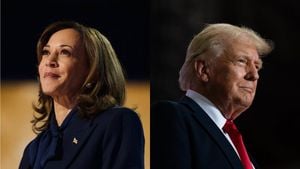Recent developments surrounding Donald Trump's potential return to the presidency have sparked renewed debate about America's foreign policy direction, particularly concerning Ukraine. The question on many minds is how Trump's victory might influence the U.S.'s stance on the protracted conflict with Russia, which has drawn eyes from various corners of the globe.
Given Trump's previous presidency, it’s impossible to ignore the impact his administration had on U.S.-Ukraine relations. Many recall the tumultuous period when Trump was accused of pressuring Ukraine to investigate political rival Joe Biden, leading to the first impeachment. This incident set the stage for discussions about political influence and foreign aid, highlighting just how intertwined domestic politics can be with international relations.
Now, as Trump seeks another shot at the White House, the stakes are again exceedingly high for Ukraine and its supporters. Trump's initial approach to Ukraine had been marked by skepticism about U.S. financial support for foreign conflicts. He often questioned the rationale behind prolonged military aid, urging fellow leaders to step up their contributions.
Trump's foreign policy, characterized by his slogan “America First,” implies less commitment to international alliances and support systems, particularly for countries embroiled in conflict like Ukraine. Analysts have pointed out this foundation has already created ripples of uncertainty among U.S. allies, leaving many wondering what lies ahead if he regains power.
But how has this sentiment evolved since Russia's invasion of Ukraine? Many argue Trump's potential return could lead to drastic shifts, especially when considering the larger geopolitical landscapes. During his presidency, Trump often demonstrated sympathies toward Russia, publicly praising President Vladimir Putin on several occasions. That could suggest a more lenient American disposition toward Moscow, which is exceptionally concerning for Ukrainians and their Western allies who continue to resist Russian aggression.
This backdrop of tension has created urgent conversations around military support. Since the beginning of the invasion, the U.S. has provided billions of dollars in military aid to Ukraine, aiding their defense against Russia. Will this support continue under Trump? Some pundits predict he may attempt to renegotiate existing aid packages, cutting back on funding or imposing conditions tied to U.S. interests. This is something Ukraine can't afford if it wants to fend off continued Russian advances.
Considering these factors, some Ukrainian officials have been vocal about their worries should Trump secure the nomination and eventually the presidency again. They’ve expressed hopes for continued bipartisan support from Congress, even if Trump's administration takes office, signaling awareness of the complex political dynamics at play.
Yet, it’s not just Trump’s policies sparking concerns—it’s the entire Republican Party's stance on aid to Ukraine. While some Republicans advocate for continued assistance, others, particularly those aligned with Trump, argue it’s time to reconsider U.S. involvement. This internal division within the GOP could lead to unpredictable outcomes, potentially isolative tactics toward Ukraine if they gain traction.
Interestingly enough, perceptions around public support for Ukraine domestically have changed as well. Initially, U.S. public sentiment showed strong resolve to support Ukraine against Russia. Recent polls suggest support is waning as economic pressures at home begin to take precedence. If Trump were to position his campaign on limited support for Ukraine, he might tap right back to the populist sentiments his base projects.
Ukraine’s future remains precarious, and as the political seasons change, the country stands at the crossroads. It’s not just Trump’s potential victory at stake; the next administration's view toward foreign policy and military aid is pivotal for Ukraine's continued resistance against the growing tide of Russian imperialism.
Many supporters of Ukraine hope to solidify bipartisan policies to maintain steady aid streams, recalling previous instances when foreign policy died at the altar of domestic squabbles. Should Trump’s past influence the future, there lies much uncertainty, prompting more national conversations about how to navigate the treacherous diplomatic waters as war continues across Europe.
It’s evident Ukraine needs allies, and ideally, one of those allies should be the United States, irrespective of which party holds office. The global response to aggression must remain steadfast as the world watches for shifts occurring behind the scenes of political campaigns. Will Trump's nostalgic 'America First' agenda push foreign interests to the back seat? Only time will tell, but the stakes are undeniably high.
Meanwhile, analysts are keeping close tabs on the situation, analyzing Trump's statements and campaign strategies to predict possible foreign policy shifts. It remains uncertain how Trump's negotiation style, once reflective of transactional ethics, could fit with maintaining or augmenting support for Ukraine, which is viewed as pivotal for the broader geopolitical climate.
The questions remain—how should allies react? And perhaps more pressing, what does it mean for the future of Ukraine?



